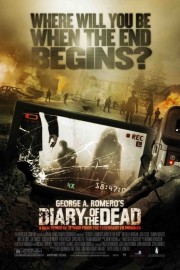Diary of the Dead
It’s kind of fitting that I was forced to watch the fifth film of George A. Romero’s iconic zombie franchise on my computer, as Romero’s satirical target this time around is our tendency to watch tragedy through a video camera (remember the amateur video of 9/11?) and post it online for general consumption. It’s also fitting that the film comes out 40 years after Romero’s landmark indie phenom that started it out, “Night of the Living Dead.” Though it may sound like heresy, “Diary” is Romero’s best film since that eerie and evocative original.
True, the Romero cult will likely chastise me for not loving the attack on consumerism in his 1978 classic “Dawn of the Dead” or his taking sexism to task in 1985’s “Day of the Dead,” but those films reek of too much camp to really satisfy my bloodlust for cinematic flesh. His lambasted 2005 entry “Land of the Dead” did more to so that in the way it evoked post-9/11 alienation of our civil rights. But “Diary” bites you right in the neck, and doesn’t let go until your arteries are spewing blood. His vision is uncompromising, and his aim is sharp…he hits his target right in the head.
As was the case with “Cloverfield,” Romero uses a hand-held camera as a window into basic human nature, although the film starts off as a “Blair Witch Project” like project. Instead of a documentary, though, film student Jason (Joshua Close) is in the woods filming a mummy movie for school when word comes out of the dead rising and reeking havoc. His collaborators want him to put the camera down as they get the Hell out of dodge, but Jason is determined to document the truth of the catastrophe when video is released that screams “establishment whitewash.” But like shooting a gun, filming human tragedy as fiction changes you. His girlfriend Deb (Michelle Morgan) sees it early on as people in the group get knocked out in encounters in a hospital, the barn of an Amish man, and (most unsettlingly) Deb’s house. But Deb resolves to preserve Jason’s documentation of the events by the end by editing things together into a doc entitled “The Death of Death.” Her joyless narration in the final product mourns not only the lives lost but the sense of morality lost in filming death. Who knew zombies could be so profound? Welcome to the wicked undead worldview of Romero. Remember- they may move slow, but the zombies always catch you in the end.










